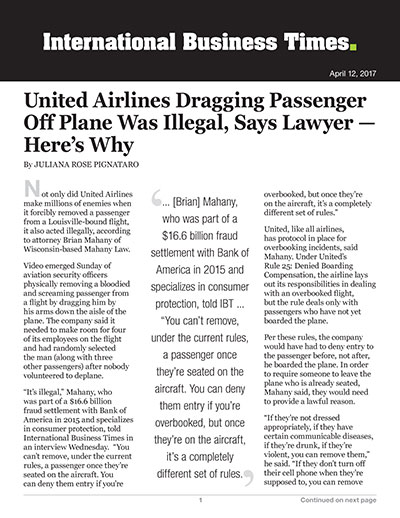Not only did United Airlines make millions of enemies when it forcibly removed a passenger from a Louisville-bound flight, it also acted illegally, according to attorney Brian Mahany of Wisconsin-based Mahany Law.
Video emerged Sunday of aviation security officers physically removing a bloodied and screaming passenger from a flight by dragging him by his arms down the aisle of the plane. The company said it needed to make room for four of its employees on the flight and had randomly selected the man (along with three other passengers) after nobody volunteered to deplane.
“It’s illegal,” Mahany, who was part of a $16.6 billion fraud settlement with Bank of America in 2015 and specializes in consumer protection, told International Business Times in an interview Wednesday. “You can’t remove, under the current rules, a passenger once they’re seated on the aircraft. You can deny them entry if you’re overbooked, but once they’re on the aircraft, it’s a completely different set of rules.”
United, like all airlines, has protocol in place for overbooking incidents, said Mahany. Under United’s Rule 25: Denied Boarding Compensation, the airline lays out its responsibilities in dealing with an overbooked flight, but the rule deals only with passengers who have not yet boarded the plane.
Per these rules, the company would have had to deny entry to the passenger before, not after, he boarded the plane. In order to require someone to leave the plane who is already seated, Mahany said, they would need to provide a lawful reason.
“If they’re not dressed appropriately, if they have certain communicable diseases, if they’re drunk, if they’re violent, you can remove them,” he said. “If they don’t turn off their cell phone when they’re supposed to, you can remove them. If they won’t obey lawful instructions from a crew member, you can remove them. But telling someone, ‘Hey, we’ve overbooked, get off the plane,’ that wouldn’t be a lawful instruction.”
LawNewz, a website run by legal correspondent Dan Abrams, agreed that the company acted illegally when it forced the passenger to de-plane. The Department of Transportation's Office of Aviation Enforcement and Proceedings said in a statement Tuesday that it had begun reviewing what happened on the flight.
“The Department remains committed to ensuring that airlines comply with consumer protection regulations and will not speculate during the review process on this matter,” it said, explaining that it would determine whether or not the airline complied with the DOT's "oversales rule."
The statement noted that “it is legal for airlines to involuntarily bump passengers when there are not enough volunteers” and that “it is the airline’s responsibility to determine its own fair boarding priorities.” It also explained that the airline would have to give all passengers who are bumped involuntarily a written statement describing their rights and detailing how the airline decided who was bumped, and that "the Department mandates compensation and other protections for passengers who have confirmed reserved space on a flight." The Department of Justice also said it was reviewing the incident.
The United flight was not an “overbooking” incident in the technical sense.
“The problem was caused by United wanting to add four of their own crew members at the last minute,” said Mahany. “In the grand scheme of things, that’s not what made this illegal, although it certainly makes it less clear. What makes it illegal is that they allowed the passenger to board.”
Citing the newest apology from CEO Oscar Munoz, Mahany said the airline likely only realized they were in hot water legally days later.
“The newest apology says, 'We will never remove a paying passenger again.' Newsflash: they can’t,” he said. “I think they realize today, three days later, that legally, they couldn’t do what they did.”
The situation could have been averted had United personnel been better trained — and had more control, Mahany said. “The line employees aren’t empowered to do anything, and the cops are always going to listen to the flight crew. If the pilot says a person has to get off, they’re going to take them off.”
It’s unclear what legal avenue the passenger will choose to pursue against the company or what the letter of the law may prescribe — but with the damaging video still making the viral rounds, the aviation giant is unlikely to find much sympathy from a jury.

